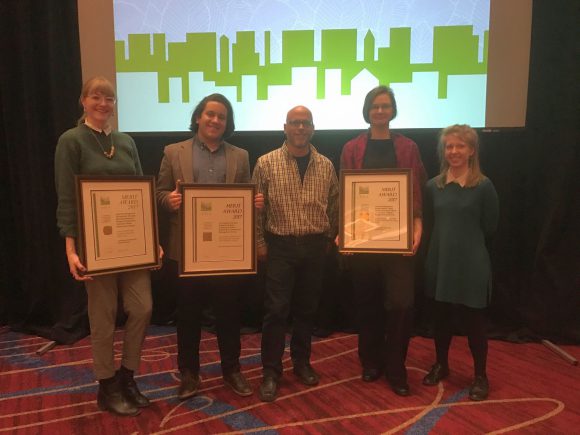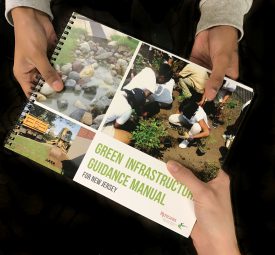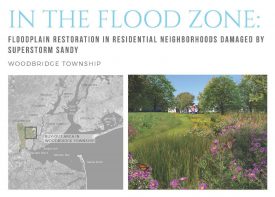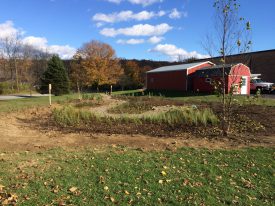
Michelle Hartmann, Christopher Perez, Jeremiah Bergstrom, Tekla Pontius-Courtney, and Marta Goraczniak, Rutgers Cooperative Extension Water Resources Program.
The Rutgers Cooperative Extension Water Resources Program was honored with three Merit Awards from the New Jersey American Society of Landscape Architects this spring. Award-winning projects included the Green Infrastructure Guidance Manual for New Jersey, the Woodbridge Township Floodplain Restoration Plan, and the McKeown Elementary School Rain Garden Partnership Project.
 The Green Infrastructure Guidance Manual for New Jersey helps make stormwater management available to a wide range of audiences. It is a multi-chapter document developed for New Jersey communities with combined sewer systems (CSS) and municipal separate storm sewer systems (MS4s) to begin understanding green infrastructure as a strategy for stormwater management.
The Green Infrastructure Guidance Manual for New Jersey helps make stormwater management available to a wide range of audiences. It is a multi-chapter document developed for New Jersey communities with combined sewer systems (CSS) and municipal separate storm sewer systems (MS4s) to begin understanding green infrastructure as a strategy for stormwater management.
The detailed guidance provides users with information on the fundamental function and benefits of select green infrastructure practices, along with corresponding technical design standards. It describes the design process for a green infrastructure practice from start to finish, guiding the user through each step from site identification to implementation.
The goal of this manual is to inform planning and design professionals, municipal engineers and officials, community groups, and inspired residents who are interested in installing green infrastructure practices to reduce negative impacts resulting from stormwater runoff.
The team working on the project included: Christopher C. Obropta, associate extension specialist and associate professor in the Department of Environmental Sciences; Jeremiah Bergstrom, senior research project manager; and Michelle Hartmann, program associate.
 The Woodbridge Township Floodplain Restoration Plan was developed in partnership with Woodbridge Township, landscape architects and ecologists at Rutgers Cooperative Extension to address flooding challenges in 200 properties in five flood-prone residential neighborhoods.
The Woodbridge Township Floodplain Restoration Plan was developed in partnership with Woodbridge Township, landscape architects and ecologists at Rutgers Cooperative Extension to address flooding challenges in 200 properties in five flood-prone residential neighborhoods.
Municipalities across New Jersey face a range of challenges as a result of flooding, which has affected at least 549 of the state’s 565 municipalities. Recent storms, including Hurricane Irene in 2011 and Superstorm Sandy in 2012, have devastated communities across the state, with an estimated $29.4 billion in damages and 30,000 properties damaged or destroyed in Superstorm Sandy alone. Flooding is particularly challenging for New Jersey, which has the highest population density and the greatest percent of impervious surface in the country.
To begin addressing these challenges, Woodbridge Township and the Rutgers Cooperative Extension specialists developed floodplain restoration and maintenance plans with a focus on increasing stormwater infiltration, reducing biweekly mowing requirements, and developing greater landscape connections. The restoration plan includes trail development, wildlife habitat, and invasive species management that is integrated with stormwater management and flood storage.
The team that developed the plan included: Brooke Maslo, assistant research professor, Department of Ecology, Evolution and Natural Resources and wildlife and research specialist; Jeremiah Bergstrom; Tekla Pontius-Courtney, unit administrator and specialist; Marta Goraczniak (SEBS’17) senior in the Department of Landscape Architecture; and Woodbridge Township.
 The McKeown Elementary School Rain Garden Partnership Project was developed by the RCE Water Resources Program and the Wallkill River Watershed Management Group. Together, one of the largest rain gardens (3,865 square feet) was installed at the McKeown Elementary School with all students participating in the implementation phases of this project.
The McKeown Elementary School Rain Garden Partnership Project was developed by the RCE Water Resources Program and the Wallkill River Watershed Management Group. Together, one of the largest rain gardens (3,865 square feet) was installed at the McKeown Elementary School with all students participating in the implementation phases of this project.
Prior to the installation, stormwater would drip from the school gutters and flood the teacher’s back parking lot while picking up nonpoint source pollution into the nearby catch basin, discharging unfiltered in the upper portion of the Paulins Kill. The rain garden was installed with donations from the larger community including, Land Power LLC, Cerbo’s Nursery, and Hampton Township. This rain garden will capture, treat, and infiltrate over 500,000 gallons of stormwater runoff annually.
The team that developed the project included: Christopher C. Obropta; Jeremiah Bergstrom; Christopher Perez, program associate; and the Wallkill River Watershed Management Group.

